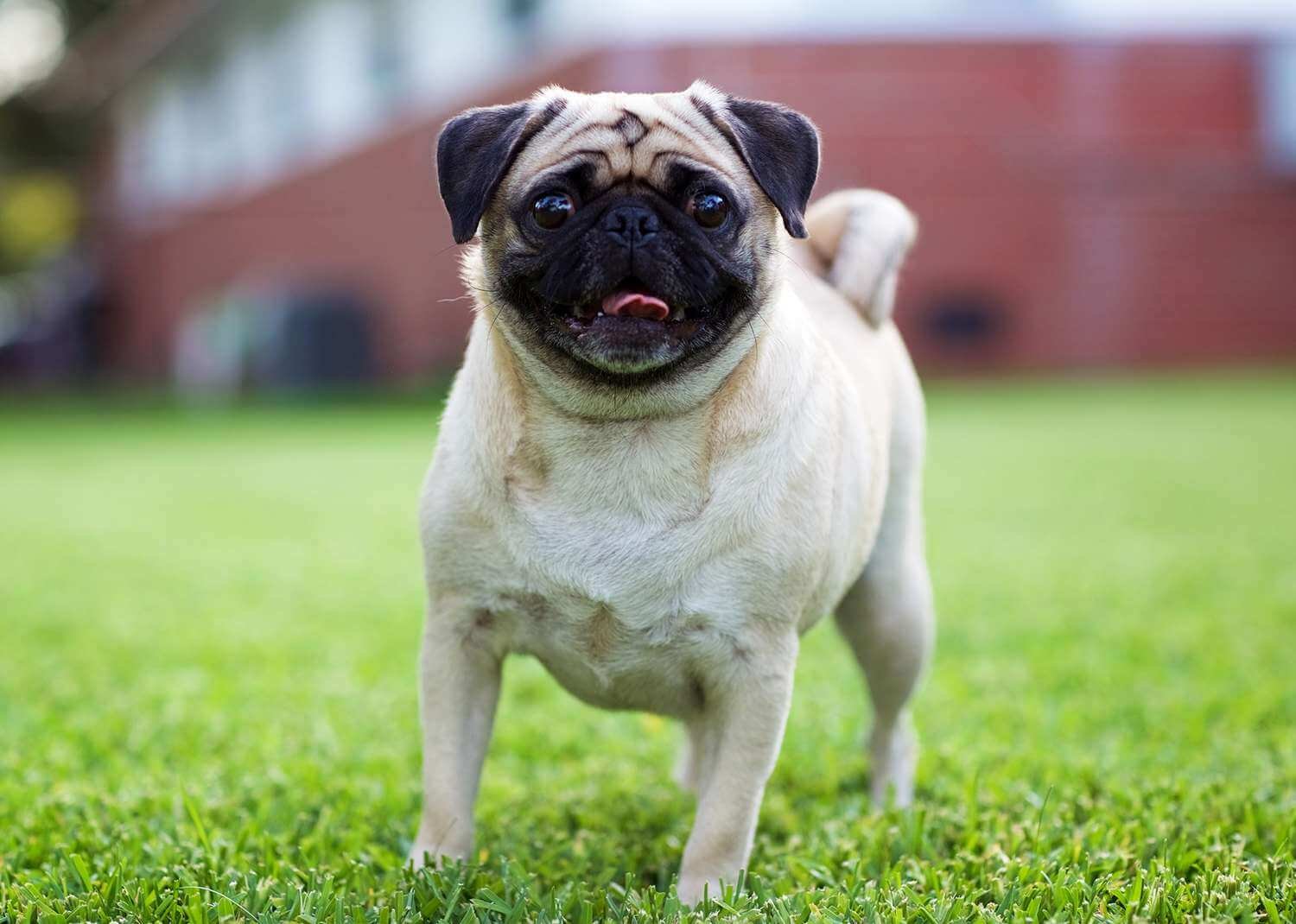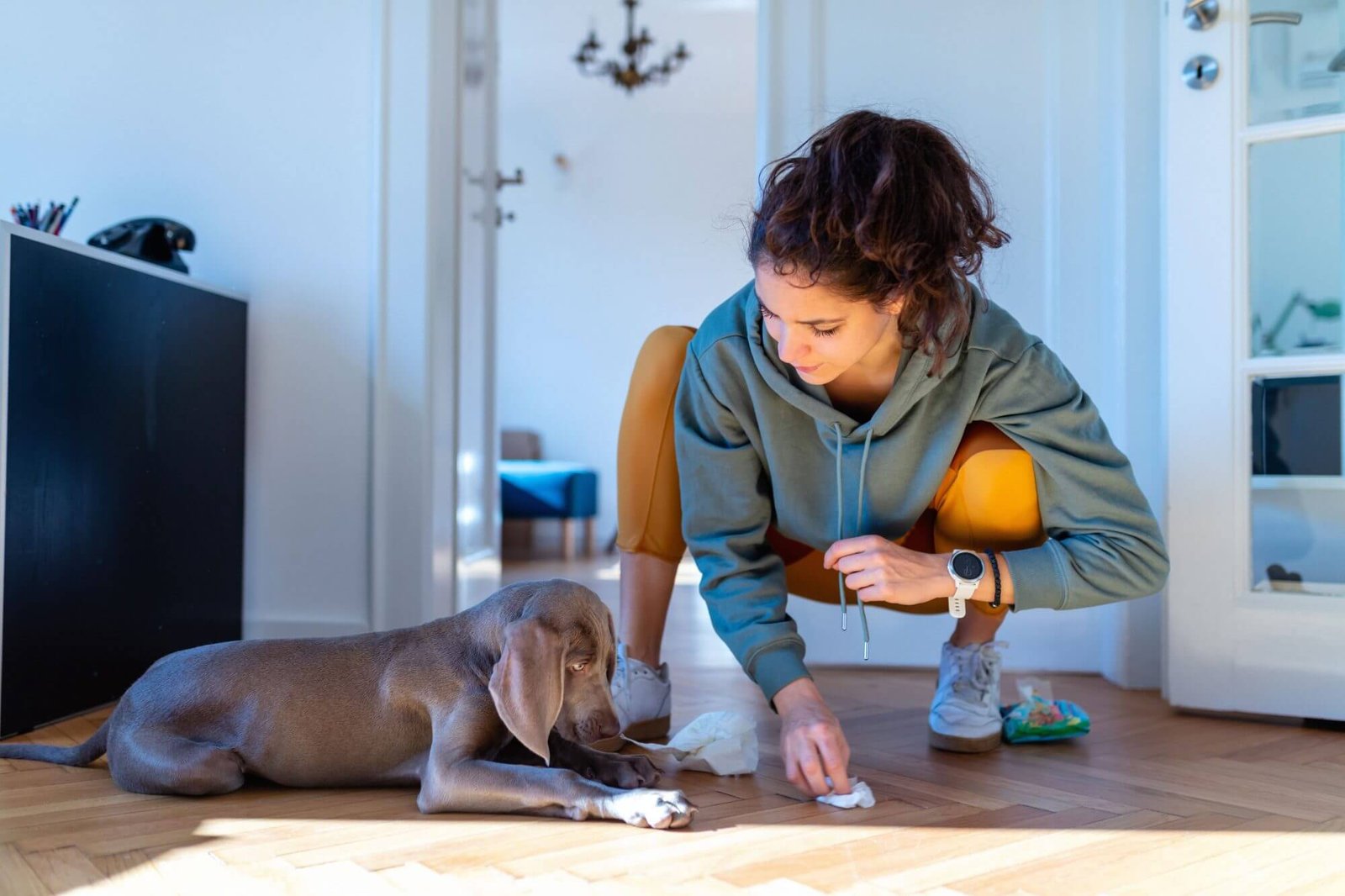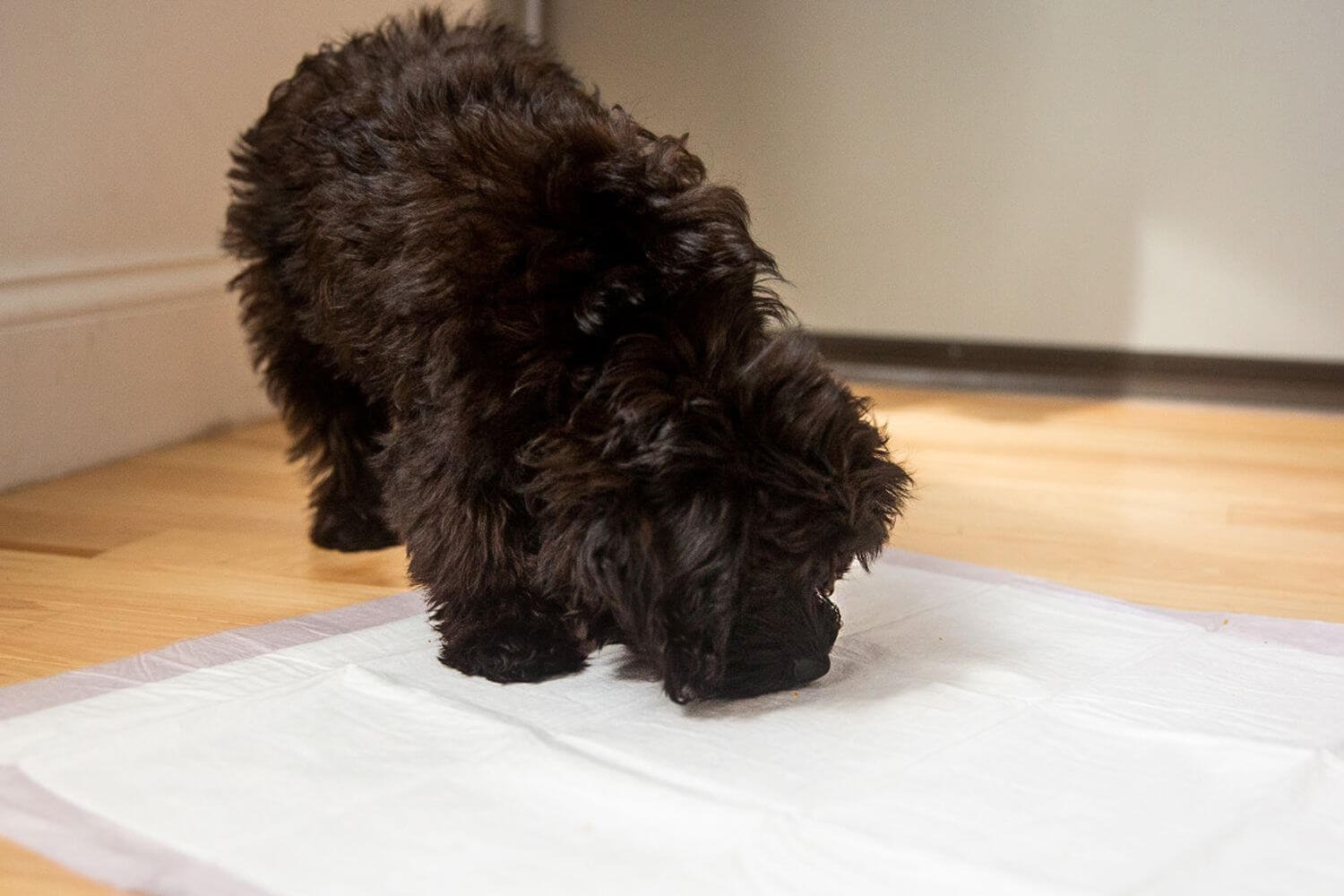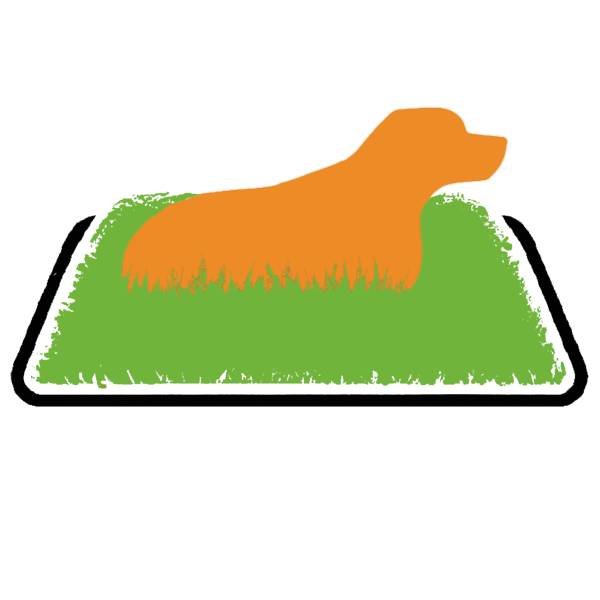I.Introduction
Explanation
Potty training a dog is never too late, although it may be more challenging with older dogs. Potty training can be lengthy and requires consistency, patience, and positive reinforcement. The best time to start potty training dogs is when they are still puppies. This is because puppies have yet to develop habits and can be easily taught. Potty training should begin when the puppy arrives at its new home. However, if you have adopted an adult dog who has not been trained, you can still teach them proper potty habits. The process may take longer, and you may need to be more patient, but with time, effort, and positive reinforcement, you can successfully train your adult dog. It’s important to note that adult dogs may have developed bad habits that need to be unlearned. They may also have medical issues affecting their ability to hold their bladder. Therefore, it is essential to consult a veterinarian to rule out any medical problems before starting potty training.
Background information about potty training dogs
Potty training, also known as housebreaking, teaches a dog to relieve itself outside or in a designated area rather than in the home. Potty training is an essential aspect of dog ownership, as it helps to maintain cleanliness and prevent unpleasant odors in the house. Potty training should start when the puppy arrives at its new home. The process involves establishing a routine for feeding and taking the puppy outside regularly to go potty. Positive reinforcement, such as praise and treats, can encourage good behavior.

Consistency is crucial in potty training. The puppy should be taken outside to the same designated area each time and at regular intervals throughout the day. Accidents are likely to occur during potty training, and it’s essential to remain patient and consistent in training the puppy. It’s important to note that some breeds may be easier or more difficult to potty train than others. Adult dogs who have yet to be potty trained may require a different approach and may take longer to learn proper potty habits.
Overall, potty training is essential to dog ownership and requires patience, consistency, and positive reinforcement.
II.The importance of potty training
Why it’s essential to potty train your dog
Potty training your dog is essential for several reasons:
- Maintaining cleanliness and hygiene: A potty-trained dog knows where it’s appropriate to relieve itself, which helps keep your home clean and hygienic. This is especially important if you have young children or family members with compromised immune systems.
- Preventing unpleasant odors: A dog that hasn’t been potty trained is likely to relieve itself wherever it wants, leading to unpleasant odors in your home. Potty training your dog helps to prevent these unpleasant smells.
- Strengthening the bond with your dog: Potty training your dog requires patience, consistency, and positive reinforcement, all of which can strengthen the bond between you and your dog.
- Avoiding destructive behavior: Dogs not potty trained are likelier to engage in dangerous behavior, such as chewing furniture or shoes. Potty training your dog can help prevent this behavior.
- Ensuring your dog’s safety: When dogs are allowed to relieve themselves in the home, they may be exposed to harmful bacteria or toxins, which can harm their health. Potty training your dog can help prevent these health risks.
In summary, potty training your dog is essential for maintaining cleanliness and hygiene in your home, strengthening your bond with your dog, preventing destructive behavior, and ensuring the safety and health of your dog.
The benefits of potty training for both you and your dog
Potty training your dog has several benefits for both you and your dog:
Benefits for your dog:
- Reduced stress and anxiety: A potty-trained dog knows where it’s appropriate to relieve itself, and this can reduce stress and anxiety that may arise from confusion or uncertainty about where to go.
- Improved health: When dogs are allowed to relieve themselves inside, they may be exposed to harmful bacteria or toxins, which can harm their health. Potty training your dog can help prevent these health risks.
- Better behavior: A potty-trained dog is more likely to have better behavior overall, as they have been taught appropriate behavior in the home.
Benefits for you:
- Maintaining cleanliness and hygiene: Potty training your dog can help maintain cleanliness and hygiene in your home, preventing unpleasant odors and potential health hazards.
- Peace of mind: Knowing that your dog is potty trained can give you peace of mind, as you don’t have to worry about accidents or damage to your home.
- Strengthened bond: Potty training your dog requires patience, consistency, and positive reinforcement, which can strengthen the bond between you and your dog.
- More freedom: When your dog is potty trained, you can give them more space in the home and outside, as they know where to relieve themselves.
Potty training your dog has several benefits for both you and your dog, including reduced stress and anxiety, improved health, better behavior, maintaining cleanliness and hygiene, peace of mind, strengthened bond, and more freedom.
III.When is the best time to potty train a dog?
The ideal age to start potty training
The ideal age to start potty training for dogs is when they are puppies, ideally around 8-12 weeks old. Puppies are still developing their habits and can be easily trained to go potty in the appropriate place. At this age, puppies are also more receptive to learning new things and adapting to their environment. Potty training at an early age also helps prevent bad habits from forming, such as going potty inside the house. It’s important to note that the period at which puppies can control their bladder and bowels varies depending on the breed and individual dog. Some puppies may be able to hold it longer than others, so it’s essential to monitor their behavior and adjust their potty training schedule accordingly.
If you adopt an older dog that has yet to be potty trained, you can still prepare them, but it may take longer and require more patience and consistency. It is essential to work with your dog and establish a routine to teach them appropriate potty behavior. The ideal age to start potty training for dogs is when they are puppies, typically around 8-12 weeks old, as they are more receptive to learning and have not yet developed bad habits.
Factors that affect potty training success
Several factors can affect a dog’s potty training success. Some of the most important factors include the following:
- Consistency: Consistency is vital in potty training. Dogs need a routine and a set schedule for going outside. If the owner is inconsistent with taking the dog out, the dog may become confused and have accidents in the house.
- Positive reinforcement: Dogs respond well to positive reinforcement, such as praise or treats, when they exhibit good behavior. This can encourage the dog to repeat the good behavior and reinforce the habit of going potty in the appropriate place.
- Age: As mentioned earlier, the dog’s age can affect its potty training success. Puppies are generally easier to train than older dogs, as they still develop their habits and behaviors.
- Breed: Some dog breeds are more accessible to train than others. For example, breeds such as the Labrador Retriever and the Poodle are generally easier to train than the Afghan Hound or the Basenji.
- Health issues: Certain health issues, such as bladder infections or incontinence, can affect a dog’s ability to hold its bladder and bowel movements. In these cases, addressing the health issue before continuing potty training is essential.
- Environment: A dog’s environment can affect its potty training success. For example, the dog may become anxious and have accidents if the home is too noisy or stressful.
Factors that affect a dog’s potty training success include consistency, positive reinforcement, age, breed, health issues, and environment. By understanding these factors, owners can help ensure their dog’s success in potty training.

IV.Can you potty train an adult dog?
Challenges of potty training an adult dog
Potty training an adult dog can present several challenges, including:
- Established habits: Unlike puppies, adult dogs may have already developed habits and behaviors related to going potty. If they have been used to potty inside the house, changing their habits may take more effort.
- Lack of routine: Adult dogs that have not been potty trained may need to establish a way to go outside. This means the owner may have to spend more time selecting a routine and consistently taking the dog out.
- Health issues: Some adult dogs may have health issues that make it more challenging to hold their bladder or bowel movements. In these cases, addressing the health issue before continuing potty training is essential.
- Fear or anxiety: Adult dogs may be fearful or anxious about going outside, especially if they have not been socialized or had negative experiences. This can make it more challenging to train them to go potty in the appropriate place.
- Negative reinforcement: If the owner has been using negative reinforcement, such as punishment or scolding, to try to stop the dog from going potty inside the house, this can make it more difficult to potty train the dog in a positive way.
- Time and patience: Potty training an adult dog requires time and patience, as it may take longer to change established habits and behaviors. It’s important to be consistent and positive in training to help the dog understand what is expected of them.
Potty training an adult dog can present several challenges, including established habits, lack of routine, health issues, fear or anxiety, negative reinforcement, and requiring time and patience. However, it is possible to potty train an adult dog with consistency, positive support, and patience.
Strategies for successfully potty training an adult dog
Potty training an adult dog requires patience, consistency, and positive reinforcement. Here are some strategies that can help in successfully potty training an adult dog:
- Establish a routine: Establish a regular routine for taking the dog outside to go potty, ideally at the exact times every day. This will help the dog understand when it’s time to go out and develop the habit of going potty outside.
- Use positive reinforcement: When the dog goes potty outside, provide positive reinforcement such as praise, treats, or a favorite toy. This will help the dog associate going potty outside with positive experiences.
- Supervise the dog: Keep a close eye on the dog to prevent accidents in the house. If you can’t supervise the dog, put them in a crate or a small, safe area where they can’t make a mess.
- Use a consistent command: Use a consistent command or phrase, such as “go potty,” to signal to the dog that it’s time to go outside and go potty.
- Clean up accidents thoroughly: If the dog has an accident inside the house, clean it up thoroughly using an enzymatic cleaner that will eliminate any odors. This will help prevent the dog from going potty in the same spot again.
- Gradually increase freedom: As the dog gets better at going potty outside, gradually increase their freedom inside the house. This can be done by giving them more space to roam and play without supervision.
- Be patient: Potty training an adult dog can take time, so be patient and don’t get discouraged if there are setbacks. Celebrate the small successes and keep working at them consistently.
Successfully potty training an adult dog requires establishing a routine, using positive reinforcement, supervising the dog, using a consistent command, cleaning up accidents thoroughly, gradually increasing freedom, and being patient. Using these strategies consistently and positively makes it possible to successfully potty train an adult dog.
Factors that affect success when potty training an adult dog
Success when potty training an adult dog depends on several factors, including:
- Consistency: Consistency is crucial when potty training an adult dog. The owner needs to establish a consistent routine and stick to it, and consistently reward the dog for going potty in the appropriate place.
- Positive reinforcement: Using positive reinforcement, such as treats, praise, and playtime, can be highly effective in motivating an adult dog to go potty outside.
- Patience: Potty training an adult dog can take time, and it’s important to be patient and persistent. The owner should expect setbacks and be prepared to work through them.
- Health issues: Health issues such as urinary tract infections or incontinence can make potty training more difficult. If the dog is having trouble holding their bladder or has frequent accidents, a trip to the vet may be necessary.
- Environment: The dog’s environment can also impact potty training success. If the environment is noisy or chaotic, it may be more challenging for the dog to concentrate on going potty outside.
- History: An adult dog’s history can also impact potty training success. If the dog has a history of going potty inside the house or has been punished for going potty in the past, it may take longer to establish new habits.
- Breed: Certain breeds of dogs may be more challenging to potty train than others. For example, small breeds may have smaller bladders and need to go potty more frequently, while some species may be more stubborn and resistant to training.
Success when potty training an adult dog depends on consistency, positive reinforcement, patience, addressing any health issues, the environment, the dog’s history, and the breed of the dog. By taking these factors into consideration and using positive, consistent training methods, it is possible to successfully potty train an adult dog.

V.Conclusion
Final thoughts on whether it’s ever too late to potty train a dog
As an AI language model, I don’t have personal opinions, but I can provide some information that might be useful for you. Potty training a dog is integral to responsible pet ownership, and it’s usually best to start as early as possible. However, there is always time to start potty training a dog. Even if the dog is several years old and has never been adequately trained, with patience, consistency, and positive reinforcement, most dogs can learn new habits. It’s essential to remember that older dogs may have some physical or medical issues that can affect their ability to hold their bladder or bowel movements for extended periods. Therefore, having realistic expectations and adjusting the training approach is crucial.
Additionally, it’s worth noting that some dog breeds are more accessible to potty train than others. For example, species like the Labrador Retriever or Poodle tend to be quick learners and respond well to training. On the other hand, some breeds, like the Afghan Hound or the Basset Hound, can be more challenging to train due to their independent nature. While it’s best to start potty training a dog as early as possible, there is always time to teach an old dog new tricks. With patience, consistency, and positive reinforcement, most dogs can learn new habits regardless of age or breed.
Try potty training your dog, regardless of age.
Potty training, also known as housebreaking, teaches a dog to relieve itself outside or in a designated area rather than in the home. Potty training is an essential aspect of dog ownership, as it helps to maintain cleanliness and prevent unpleasant odors in the house. Potty training should start when the puppy arrives at its new home. The process involves establishing a routine for feeding and taking the puppy outside regularly to go potty. Positive reinforcement, such as praise and treats, can encourage good behavior.
If you have a dog, regardless of age, I encourage you to try potty training them. Potty training is essential to responsible pet ownership, and there is always time to start. You can teach your dog to go potty outside and avoid accidents indoors with patience and consistency. Remember, potty training is a process that takes time and effort, so it’s essential to stay positive and be patient. Celebrate every success and use positive reinforcement to encourage good behavior.
Don’t scold or punish your dog for accidents, which can cause confusion and anxiety. Establish a routine, watch for signs, and consider using a crate to help with potty training. Every dog is different; some may take longer to train than others. But with persistence and commitment, you can help your dog learn new habits and become reliably potty trained.
So, take the challenge and try potty training your dog today. Your dog will thank you, and you’ll benefit from a happier, healthier, and cleaner home.



